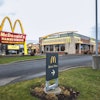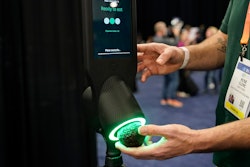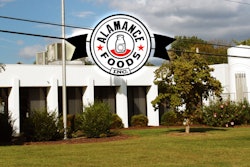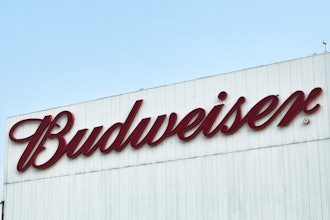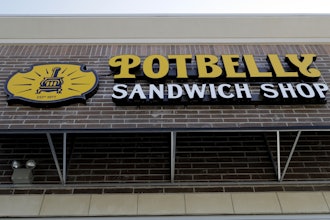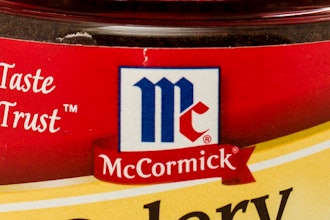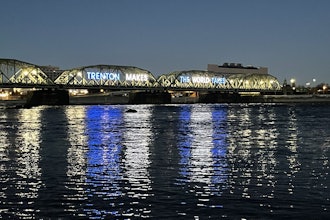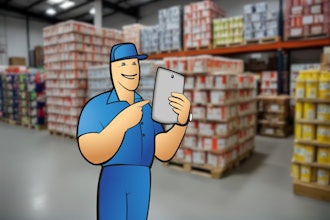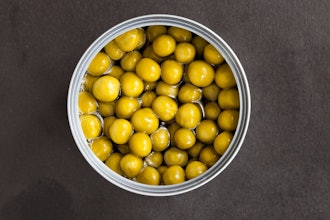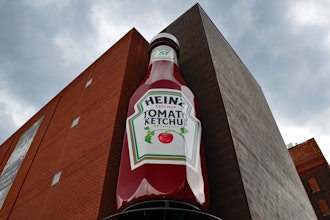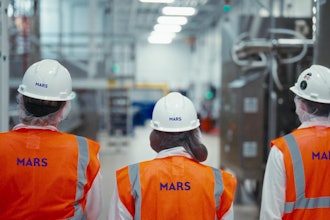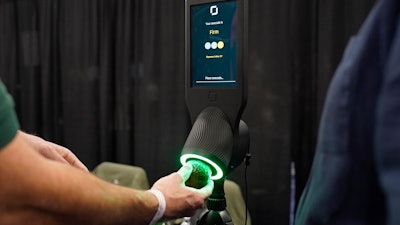
LAS VEGAS (AP) — Avocados can be tricky. Their ripeness window is so narrow that a slew of memes poke fun at the fine art of deciding when to eat them.
Dutch entrepreneur Marco Snikkers aims to solve that problem with an avocado scanner unveiled this week at the CES tech show in Las Vegas and designed for use in supermarkets. It uses optical sensing and AI technology to determine ripeness, displaying on a screen whether an avocado is firm or ready to eat.
Snikkers' startup, OneThird, isn't just trying to reduce frustration in the kitchen. According to the United Nations, about one-third of food is wasted globally. That means all the carbon emitted to grow, ship and distribute that food was for naught.
"That's a huge problem," Snikkers said. "That's a trillion dollar issue for our world and it has a huge impact on C02 emissions and water usage."
OneThird is one of several start-ups at this year's CES working to solve different components of the problem, from helping the food industry limit what it throws away to offering rapid composting solutions to help keep food scraps out of methane-producing landfills.
OneThird already works with growers, distributors and others along the supply chain to predict the shelf life of avocados, tomatoes, strawberries and blueberries. It will further expand its ability to determine ripeness for more produce later this year, aiming to help reduce the amount of food that is wasted around the world. And it's testing the consumer-friendly avocado scanner at a supermarket in Canada this month.
Another Dutch entrepreneur, Olaf van der Veen, is working to empower restaurants to reduce food waste, the majority of which happens in a kitchen before a meal is even served to customers.
His device, Orbisk, uses a camera positioned over a trash can to scan whatever food is about to be tossed. In addition to seeing the type of food, amount and time of day, "we can see if it's on a plate, in a pan, on a cutting board, which gives circumstantial information on why it was lost," van der Veen said.
Orbisk organizes and shares that insight with the restaurant so they can understand their disposal patterns, helping them save money and reduce food waste, and with it, emissions and water use.
The startup's devices are positioned in commercial kitchens in about 10 European countries, with some clients as far as India.
He said that even after some surplus food is donated, there's more food waste per restaurant in the U.S. than in Europe. That's why the company is at CES, he said, hoping to expand its nascent market further.
Reducing the amount of wasted food is preferable, but keeping tossed food out of landfills is the next best option.
When food scraps are properly composted, they release carbon dioxide as part of the biological process of turning into nutrient-rich soil. When food is trapped in landfills, the decomposition process produces methane — a potent greenhouse gas that contributes significantly to global warming because it packs a stronger short-term punch more than 80 times stronger than even carbon dioxide.
The 2006 London Protocol banned dumping food waste into the ocean, prompting South Korea to set up a system of mandatory composting. While the infrastructure allows the country to properly dispose of nearly all its food waste, residents have to haul bags of food to designated curbside bins.
Reencle is designed to make that process easier. The metal bin is a hyper-fast composting system showcased at CES this year, and helps households reduce one kilogram (2.2 pounds) of food scraps by 90% volume in just 24 hours.
While the product has sold tens of thousands of units in South Korea, Reencle's parent company Hanmi Flexible hopes to expand to overseas markets, marketing director Jinhwi Bang said.
How is it so fast? The device uses self-replicating microorganisms to turn scraps into compost. Its competitor, Lomi, grinds and dehydrates food scraps, requiring the byproduct to be mixed with soil before composting, whereas Reencle says its byproduct can be composted directly.
Mark Murray, Executive Director of Californians Against Waste, says he hopes people don't think advanced technology is needed to be able to compost.
But he says he understands that not everyone has a yard or a patio, and that "all of the tools in the toolbox have to be on the table."
Technology is part of the solution. But Murray says economic incentives and systemic change are the other key components to reducing global food waste.
"We need to make it more expensive to waste food," he said. "That'll create the incentive for commercial enterprises, for restaurants, for stores, for even consumers to invest in systems and technology for making sure that we don't waste food."

